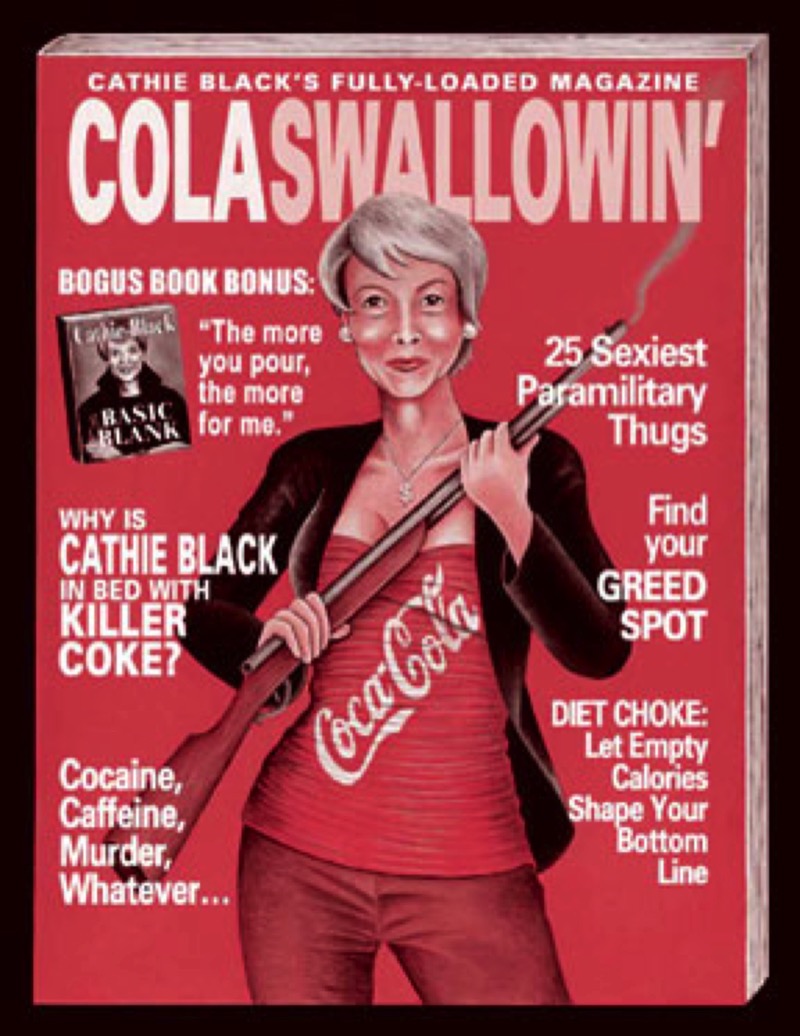Killer Coke Campaign Opposes Cathie Black Appointment
By Billy Wharton | Bronx County Independent Examiner | November 17th, 2010
Read Article

Talk about a bad start. Mayor Michael Bloomberg's appointment of Cathie Black has drawn outrage from all corners of New York City. Teachers are up in arms. Politicians are jumping ship. Parents are furious about not having a voice. And no one wants to be the party that asks for the no education experience waiver. Now, activists targeting the Coca-Cola Corporation are joining in the fray.
The Killer Coke campaign has taken a stand against the appointment of Black. It seems that the "publishing industry" is not the only place Black has been earning a living. She has made millions by acting as a director and top policy maker at Coca Cola since 1993.
During this time, Black and Coke have run aggressive marketing campaigns that target sales to school-age children. "We know high school students will continue to drink Coca-Cola products for 50-60 years...we're trying to gain their business for the future," said a Coca-Cola Youth Market Representative. However, excessive soda consumption is viewed as an important contributing factor to the ongoing childhood obesity epidemic.
Anti-coke campaigners also point to Black's consistent opposition to human rights reform proposals at the company. They document a long history of the intimidation, torture and assassination of union leaders at Coca-Cola bottling plants in places like Colombia. The Killer Coke campaign recently collaborated with the United Steelworkers Union in an, as yet, unsuccessful court case to bring the company to justice. Similar charges have been filed in relation to workers at Coke plants in Guatemala.
Black has been directly involved in Coke's operations in China. Here, the company has, once again, employed a child-marketing campaign to carve out market share while facing accusations of labor violations including the use of prison labor. Black voted against multiple resolutions presented at Coca-Cola shareholder meetings that would have recognized these abuses.
Black has attended many other shareholder meetings where resolutions were introduced to address the environmental degradation, labor abuses and the negative social impact of the company. Several of these resolutions asked for the company to pass an international code of conduct for the treatment of workers at all Coca-Cola bottling plants. In each case, Cathie Black remained silent.
Black has publicly stated that she would resign from her position at Coca-Cola if it were deemed a conflict of interest. However, the Killer Coke campaign is joining others in calling for her appointment to be blocked. They described her as having an, "immoral focus on the bottom line at the expense of the lives of children and their families," that "makes her unqualified for this position."
After being pressed about her lack of education credentials, Black pledged to "read up" to prepare for her new position. She might start with the story Isidro Segundo Gil, a Colombian trade union leader who was murdered by paramilitaries hired by the local Coca-Cola bottler. When Gil's wife became involved in the campaign to bring her husband's murderers to justice, she too was killed. New Yorkers will have to weigh whether they want their school system being run by a person who has made a career out of ignoring these kinds of serious human rights abuses. What message does it send to students?
Billy Wharton is a writer, activist and the editor of the Socialist WebZine. His articles have appeared in the Washington Post, the NYC Indypendent, Spectrezine and the Monthly Review Zine. He can be reached at whartonbilly@gmail.com. Become a FAN on Facebook.
FAIR USE NOTICE. This document contains copyrighted material whose use has not been specifically authorized by the copyright owner. The Campaign to Stop Killer Coke is making this article available in our efforts to advance the understanding of corporate accountability, human rights, labor rights, social and environmental justice issues. We believe that this constitutes a 'fair use' of the copyrighted material as provided for in section 107 of the U.S. Copyright Law. If you wish to use this copyrighted material for purposes of your own that go beyond 'fair use,' you must obtain permission from the copyright owner.











